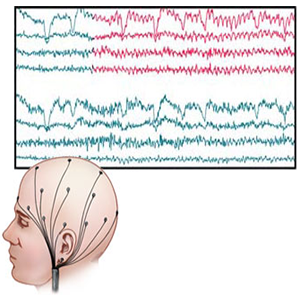Epilepsy is a condition that affects 0.6-0.8% of the world population, rendering it the most common neurological disorder after stroke. It is characterized by recurrent unprovoked seizures, due to abnormal, excessive or synchronous neuronal activity in the brain and by a vast range of causes, triggering events, symptoms and brain locations where the seizures originate. In 25% of the affected population, seizures cannot be controlled by antiepileptic drugs or surgery. However, it has been suggested, that at least some types of seizures are predictable. Many researchers have extensively sought to characterize this transition from the inter-ictal to the ictal state (pre-ictal phase) in quantitative terms and develop automated seizure prediction algorithms based on electroencephalographic (EEG) measurements. However, the reported results have not always proven to be reproducible and further foundational research is required for this purpose. Apart from the studies related to seizure prediction based on continuous EEG measurements, physiological signals such as heart rate variability have been considered as predictors of epileptic seizures.
 Seizures compromise the quality of life of patients with epilepsy to a great extent and may result in serious self-injuries from various causes. Epilepsy has been also associated with a sudden death rate that is at least 10 times of the same rate for the general population (sudden unexplained death in epilepsy – SUDEP). Therefore, the importance and usefulness of seizure prediction cannot be overstated, as it would increase epileptic patients’ autonomy, drastically reduce accidents and self-injuries related to epileptic seizures and, as a whole, improve the patients’ quality of life dramatically. In this context, the objective of the present project is to perform multimodal seizure prediction from long-term EEG and ECG data, by also considering subjective prodromal information. To this end long-term simultaneous video-EEG and ECG measurements will be collected at the Cyprus Institute for Neurology and Genetics and the occurrence of prodromal symptoms will be recorded. Subsequently, the performance of existing and novel patient-specific EEG and ECG seizure prediction algorithms will be assessed and efficient data fusion schemes that will integrate the aforementioned multimodal information in order to improve the overall prediction performance will be designed. The project is coordinated by the Department of Electrical and Computer Engineering, University of Cyprus and the KOIOS Research Center (G. Mitsis – Principal Investigator) and it also includes the Cyprus Institute for Neurology and Genetics and the National Technical University of Athens as partners.
Seizures compromise the quality of life of patients with epilepsy to a great extent and may result in serious self-injuries from various causes. Epilepsy has been also associated with a sudden death rate that is at least 10 times of the same rate for the general population (sudden unexplained death in epilepsy – SUDEP). Therefore, the importance and usefulness of seizure prediction cannot be overstated, as it would increase epileptic patients’ autonomy, drastically reduce accidents and self-injuries related to epileptic seizures and, as a whole, improve the patients’ quality of life dramatically. In this context, the objective of the present project is to perform multimodal seizure prediction from long-term EEG and ECG data, by also considering subjective prodromal information. To this end long-term simultaneous video-EEG and ECG measurements will be collected at the Cyprus Institute for Neurology and Genetics and the occurrence of prodromal symptoms will be recorded. Subsequently, the performance of existing and novel patient-specific EEG and ECG seizure prediction algorithms will be assessed and efficient data fusion schemes that will integrate the aforementioned multimodal information in order to improve the overall prediction performance will be designed. The project is coordinated by the Department of Electrical and Computer Engineering, University of Cyprus and the KOIOS Research Center (G. Mitsis – Principal Investigator) and it also includes the Cyprus Institute for Neurology and Genetics and the National Technical University of Athens as partners.







